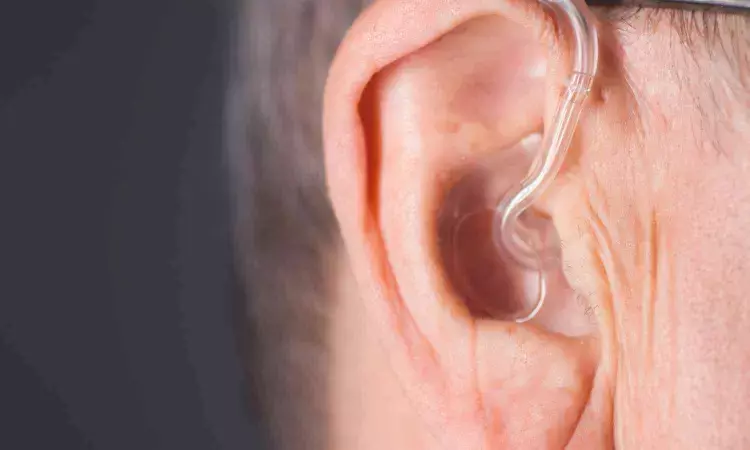- Home
- Medical news & Guidelines
- Anesthesiology
- Cardiology and CTVS
- Critical Care
- Dentistry
- Dermatology
- Diabetes and Endocrinology
- ENT
- Gastroenterology
- Medicine
- Nephrology
- Neurology
- Obstretics-Gynaecology
- Oncology
- Ophthalmology
- Orthopaedics
- Pediatrics-Neonatology
- Psychiatry
- Pulmonology
- Radiology
- Surgery
- Urology
- Laboratory Medicine
- Diet
- Nursing
- Paramedical
- Physiotherapy
- Health news
- Fact Check
- Bone Health Fact Check
- Brain Health Fact Check
- Cancer Related Fact Check
- Child Care Fact Check
- Dental and oral health fact check
- Diabetes and metabolic health fact check
- Diet and Nutrition Fact Check
- Eye and ENT Care Fact Check
- Fitness fact check
- Gut health fact check
- Heart health fact check
- Kidney health fact check
- Medical education fact check
- Men's health fact check
- Respiratory fact check
- Skin and hair care fact check
- Vaccine and Immunization fact check
- Women's health fact check
- AYUSH
- State News
- Andaman and Nicobar Islands
- Andhra Pradesh
- Arunachal Pradesh
- Assam
- Bihar
- Chandigarh
- Chattisgarh
- Dadra and Nagar Haveli
- Daman and Diu
- Delhi
- Goa
- Gujarat
- Haryana
- Himachal Pradesh
- Jammu & Kashmir
- Jharkhand
- Karnataka
- Kerala
- Ladakh
- Lakshadweep
- Madhya Pradesh
- Maharashtra
- Manipur
- Meghalaya
- Mizoram
- Nagaland
- Odisha
- Puducherry
- Punjab
- Rajasthan
- Sikkim
- Tamil Nadu
- Telangana
- Tripura
- Uttar Pradesh
- Uttrakhand
- West Bengal
- Medical Education
- Industry
Low-dose aspirin does not slow progression of age-related hearing loss in healthy older adults: JAMA

Australia: Low-dose aspirin does not impact the progression of age-related hearing loss in healthy older adults, as revealed by a secondary analysis of the ASPREE Randomized Clinical Trial.
"In the prespecified secondary analysis of 279 participants aged 70 years or older in the ASPREE clinical trial, aspirin use did not affect the age-related decline in hearing threshold or in binaural speech perception threshold versus placebo over a follow-up period of 3 years," the researchers reported in JAMA Network Open.
Age-related hearing loss is prevalent in the aging population, affecting communication and worsening the quality of life. It occurs due to cochlear degeneration and may be further exacerbated by microvascular changes and inflammation, as observed in animal models. David P. Q. Clark, Monash University, Victoria, Australia, and colleagues aimed to compare the effect of daily low-dose aspirin versus placebo on the progression of age-related hearing loss in healthy older adults.
For this purpose, the researchers conducted a prespecified secondary analysis of the ASPREE randomized clinical trial. Participants comprised 279 healthy community-dwelling individuals in Australia aged 70 years and above and free of overt dementia, cardiovascular diseases, and life-limiting illnesses. Participants' recruitment was between 2010 and 2014 and followed up over three years.
The participants were administered a 100-mg daily dose of enteric-coated aspirin or a matching placebo.
Hearing measures included air conduction audiometry and binaural speech perception in noise. Evaluations were done at baseline, 18 months, and three years. An intention-to-treat approach was used to analyze the change from baseline hearing measures. Following adjustments for sex, age, smoking, and diabetes, aspirin and placebo were compared.
The following were the key findings of the study:
- Of 279 participants, 55% were male, and the median age at baseline was 73.1 years.
- 71% of participants in the aspirin group and 67% in the placebo group reported experiencing hearing loss at baseline.
- Compared with placebo, aspirin did not affect the changes in mean 4-frequency average hearing threshold from baseline to year 3 (aspirin: baseline, 27.8 dB; year 3, 30.7 dB; difference, 3.3 dB; placebo: baseline, 27.5 dB; year 3, 30.9 dB; difference, 3.0 dB) nor any other tested frequencies.
- An increase in air conduction threshold indicates a deterioration in hearing.
- For the mean speech reception threshold, there was no significant difference observed between the aspirin and placebo group at the year three follow-up assessment (aspirin: baseline, –9.9 dB; year 3, –9.1 dB; difference, 0.9 dB; placebo: baseline, –10.5 dB; year 3, –9.6 dB; difference, 0.9 dB).
- The findings were consistent across sex, age groups, diabetes, and smoking status.
The findings showed that a daily 100-mg low dose of aspirin over three years did not reveal any significant effect on the progression of age-related hearing loss.
"The findings add valuable data to the ongoing discussion on aspirin and hearing health, however, future trials are required to determine whether other anti-inflammatory or antiplatelet agents exert a protective effect on hearing loss," the researchers wrote.
"Furthermore, the complex relationship between aspirin, inflammation, and hearing loss warrants continued investigation to potential mechanisms and clinical implications," they concluded.
Reference:
Clark DPQ, Zhou Z, Hussain SM, et al. Low-Dose Aspirin and Progression of Age-Related Hearing Loss: A Secondary Analysis of the ASPREE Randomized Clinical Trial. JAMA Netw Open. 2024;7(7):e2424373. doi:10.1001/jamanetworkopen.2024.24373
Dr Kamal Kant Kohli-MBBS, DTCD- a chest specialist with more than 30 years of practice and a flair for writing clinical articles, Dr Kamal Kant Kohli joined Medical Dialogues as a Chief Editor of Medical News. Besides writing articles, as an editor, he proofreads and verifies all the medical content published on Medical Dialogues including those coming from journals, studies,medical conferences,guidelines etc. Email: drkohli@medicaldialogues.in. Contact no. 011-43720751


